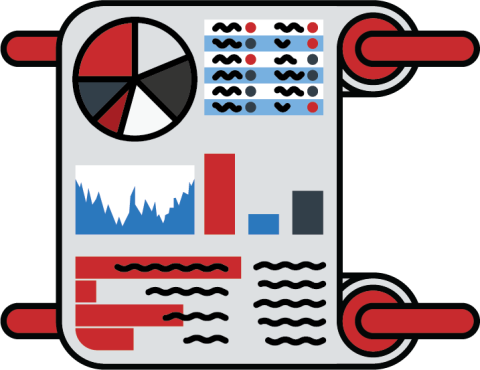
Predict Financial Risk With Accuracy and Precision
The perfect mix of accuracy and precision
Predictive Intelligence + Descriptive Historical Summaries
Industry-Leading Analytics
The perfect mix of accuracy and precision
- Identify financially distressed counterparties with enough time for mitigation and without the burden of having too many counterparties to review.
- Focus your attention on your most risky counterparties.
- Leverage our breadth and depth of data for detailed analysis where it's warranted.


Predictive Intelligence + Descriptive Historical Summaries
We characterize our analytics under two categories: Predictive Intelligence Scores and Descriptive Historical Summaries.
- Predictive Intelligence Scores provide forward-looking probabilities of failure on counterparties with extensive testing and validation across the business cycle to give you actionable insights.
- Descriptive Historical Summaries provide backward-looking context for how counterparties have performed in the past. For clarity, while understanding past performance is valuable, in volatile environments where the future does not look like the past, relying on such historical summaries can provide hazardous signal and a false sense of security.
Our Predictive Intelligence Scores on 5,000,000+ businesses include:
FRISK® Score
Public Company Risk Captured in Real-Time
Our FRISK® Score model incorporates four powerful risk inputs:
- “Merton”-type model of stock market capitalization and volatility
- Financial ratios, including those used in the Altman Z”-Score Model
- Agency ratings
- Website click pattern data from CreditRiskMonitor® subscribers, representing key credit decision-makers at nearly 40% of the Fortune 1000 plus thousands of other large companies worldwide
Since the start of 2017, the FRISK® Score’s rate of success in capturing public company bankruptcy is 96%.
In any given year, you can count on one hand the times we miss – and in those outlier cases, the circumstances deal with unusual, unforeseen events such as natural disasters and fraud.
PAYCE® Score
Private Company Bankruptcy Prediction without Financial Statements
- Predicts the risk of bankruptcy in the next 12 months with improved accuracy and precision
- Covers more than 330,000 private businesses including nearly all U.S. private companies with annual revenue of $5 million or more
- Captures 80% of all reported bankruptcies within 12 months of scoring
- Distilled highest-risk classification: ~50% of reported bankruptcies scored as PAYCE® "1" or "2" before filing; the group only represents 2.5% of the population
Z’’-Score
Trusted Open Financial Ratio Based Guide
Developed by Dr. Edward Altman of New York University close to 30 years ago, the Z''-Score is an effective financial statement-based bankruptcy model for the manufacturing, merchandising and service sectors.
The Z’’-Score is calculated on a quarterly basis, provided the variables required by the scoring model are reported.
Descriptive Historical Summaries on 4,000,000+ businesses include:
Days Beyond Terms (DBT) Index or Payment Behavior Score
How Punctual Were Companies in Paying Their Recent Bills?
The DBT Index or Payment Behavior Score measures a company's on-time (or late) payment performance using historical payment data. The calculation is based on monthly B2B Accounts Receivable Aging data provided by members of our Trade Contributor Program.
Proven Accuracy
With our proprietary, AI/ML-driven scores, you'll have the most accurate predictions of business failure in the market.
- FRISK® Score / 96% bankruptcy capture rate for publics, 90% for private companies
- PAYCE® Score / 80% bankruptcy capture rate for private companies
These credit models assess company bankruptcy risk daily and look forward over a 12-month period, with a successful capture considered to provide at least three months of advanced warning.
When it comes to financial risk analysis, both predictive intelligence scores and descriptive historical summaries have their place. But when it comes to avoiding the worst impacts of bankruptcy, our predictive approach is the way to go.